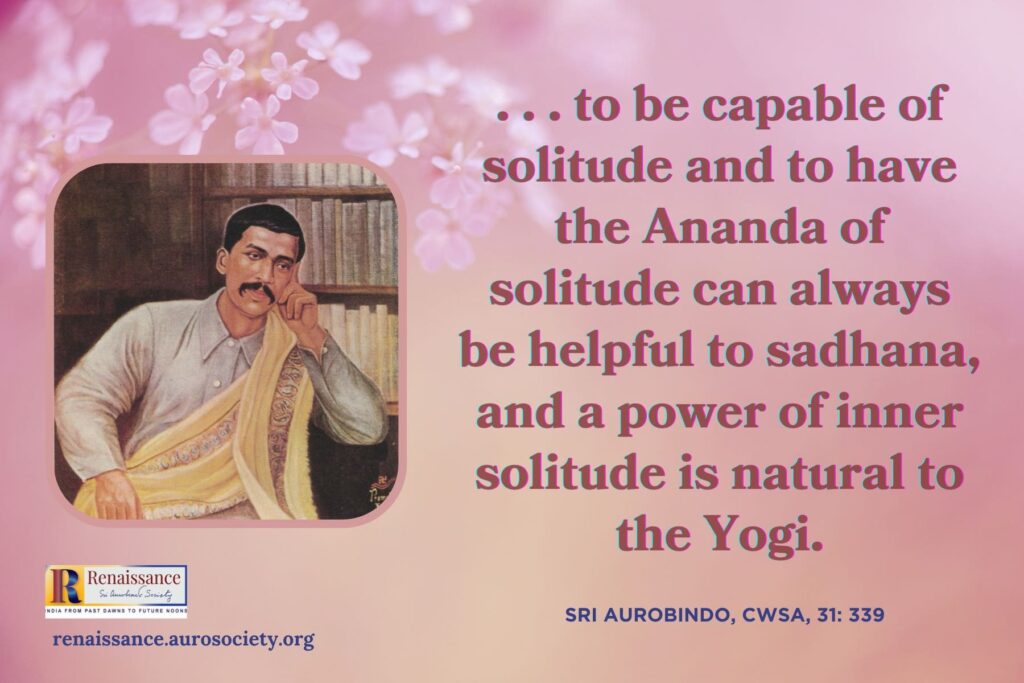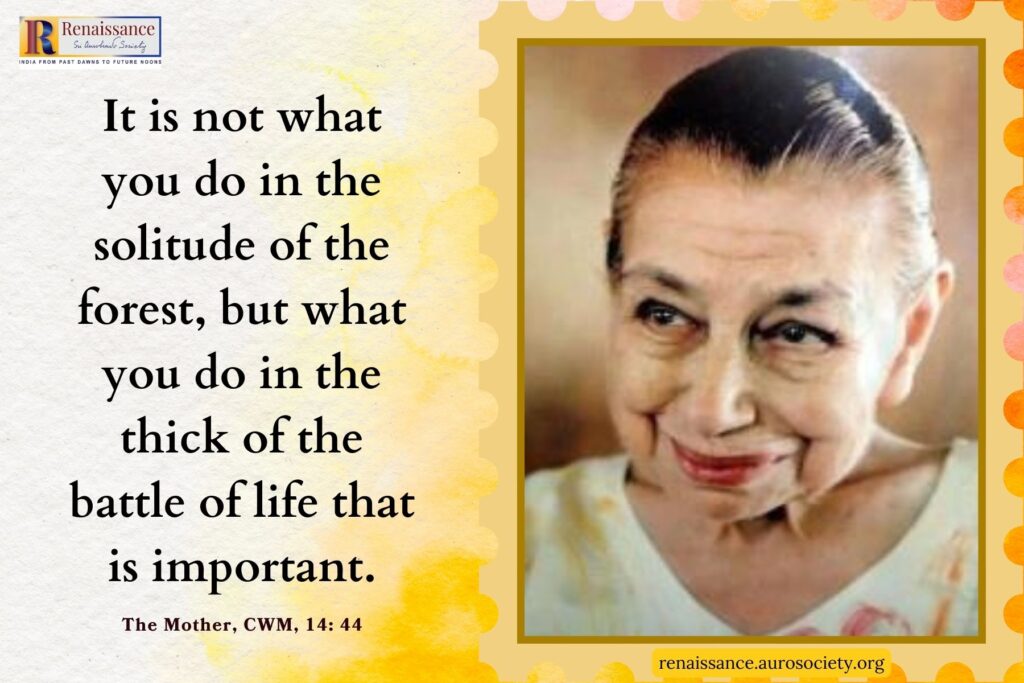Volume V, Issue 5
Author: Sri Aurobindo
Editor’s Note: If the goal of Integral Yoga is transformation or change of life, not rejection of life, what is the rightful place of and the right attitude to have toward solitude and retirement from external activity? Sri Aurobindo helps us understand this through these letters selected for this feature.

Desirability of Limiting Contacts with Others
It is certainly a great help to be able to limit one’s contacts provided it is not carried too far. I must note however that even with limited contacts undesirable waves can get in—it is a measure of precaution but does not make you absolutely safe. On the other hand complete withdrawal carries one to another extreme and has its own dangers.
The complete safety from “stuff” distracting, disturbing, externalising etc., can only come from a growth of the consciousness within. In the interim absorption and limitation of contacts like that can be a helpful measure if used in a judicious way.
***
One has to go inside into the inner being and one can minimise contacts, if necessary, not as an absolute rule—provided there is a real living in the inner being and sufficient contact with outside things not to lose one’s hold of practical realities. But if there is an isolation which brings depression, inertia, unhappiness, gloom or else morbidity of any kind, then it is evident that the retirement is not wholesome.
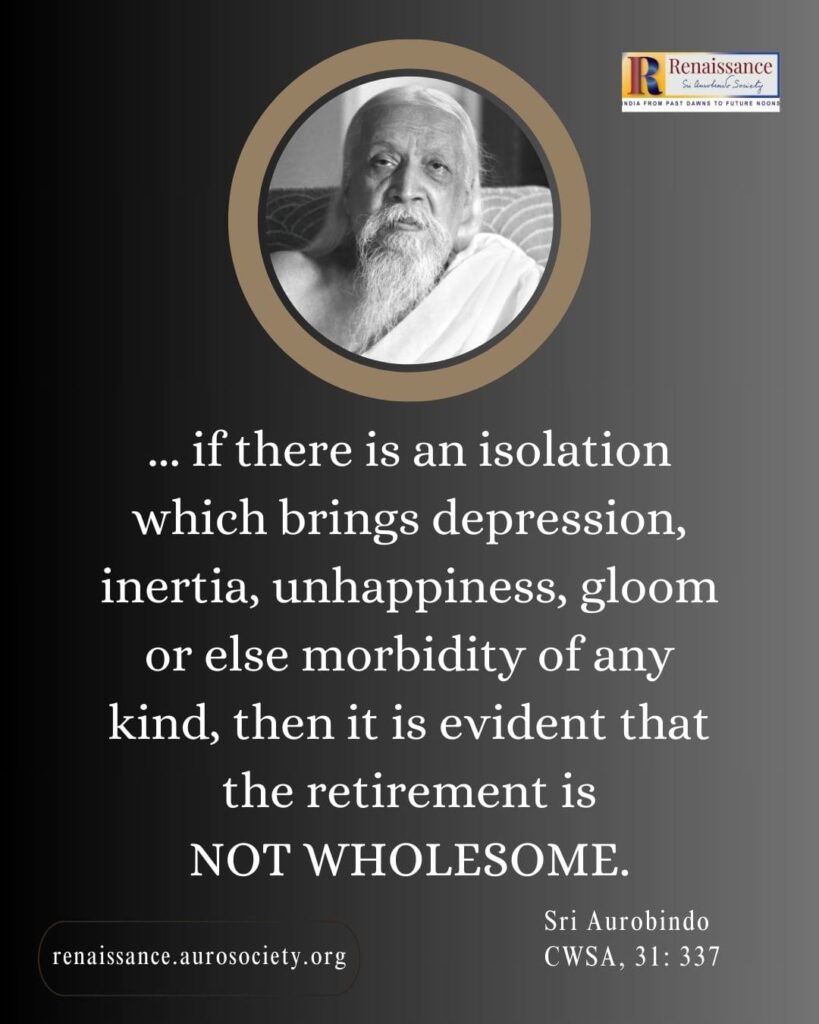
***
The avoiding of contacts does not by itself bring the fundamental immunity, it is only a change of that part of the consciousness that can do it.
But it may be advisable to minimise the contacts that strongly bring the trouble so long as the change is not there. It is not certain that a long retirement brings about the change of the subconscient,—the long retirement of the Sannyasin is part preparation of a retirement from life altogether—it is different in our Yoga which wants to change, but not reject life.
***
It is true that one has to try to keep the inner condition under all circumstances, even the most adverse; but that does not mean that one has to accept, unnecessarily, unfavourable conditions when there is no good reason for their being allowed to go on. Especially, the nervous system and the physical cannot bear an excessive strain as well as the mind and higher vital; your fatigue came from the strain of living in one consciousness and at the same time exposing yourself too much to prolonged contacts from the ordinary consciousness.
A certain amount of self-defence is necessary—so that the consciousness may not be pulled down or out constantly into the ordinary atmosphere or the physical strained by being forced into activities that have become foreign to you.
Those who practise Yoga often seek refuge in solitude from these difficulties; that is unnecessary here, but all the same you need not submit to being put under this kind of useless strain always.
~ Sri Aurobindo, CWSA, Vol. 31, pp. 337-338
***
Qualified Utility of Retirement for Sadhana
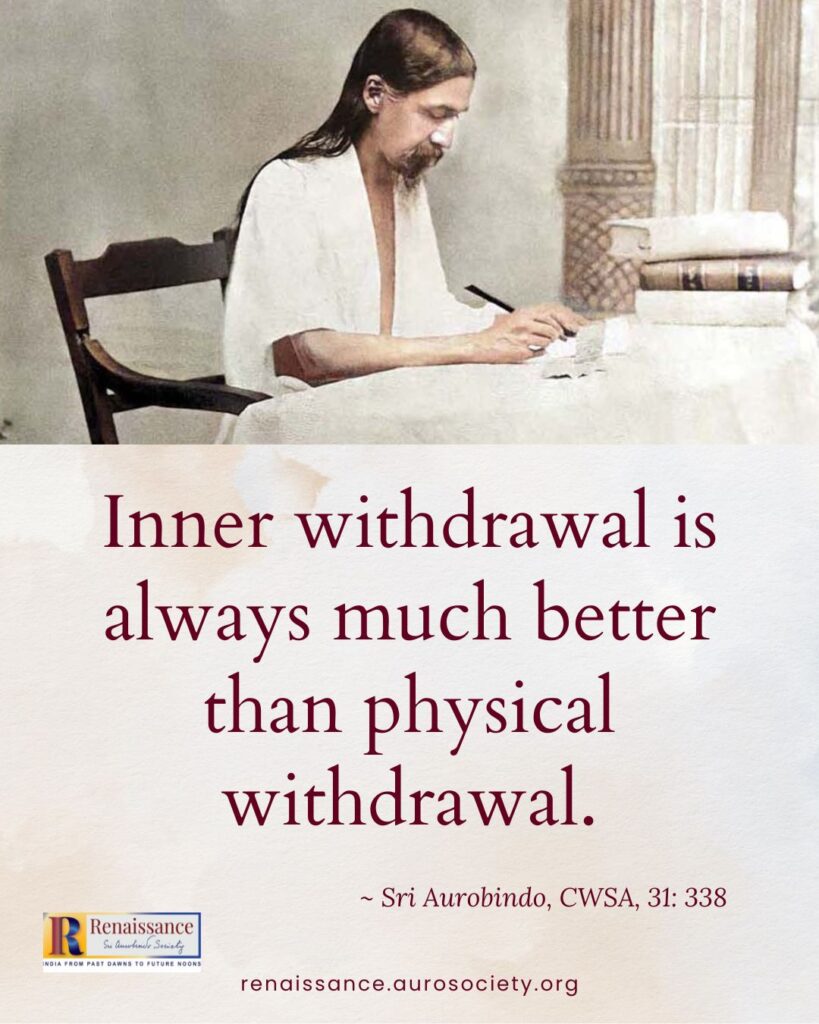
We have no objection to your doing this [withdrawing from social contacts] for a week, as you propose; I understand that it is not a retirement, but a cessation of social visits. My objection to retirement is that so many have “gone morbid” by it or gone astray into zones of false vital experiences; secondly, that absolute retirement is not necessary for the spiritual life.
It is different however for people like X who are to the manner born or at least perfectly trained. A “restriction of publicity” is quite another matter. Also to be capable of solitude and to have the Ananda of solitude can always be helpful to sadhana, and a power of inner solitude is natural to the Yogi.
We will give our help and hope you will succeed—at least, you will have established a precedent for withdrawing whenever you want in the future.
***
The impulse to retire comes from some push to concentrate within—but the cause of the push varies in different cases. There are certain cases in which there was a desire to isolate oneself from the Mother’s influence (Pranam, meditation etc.) and follow one’s own fancies, e.g. X, Y, also perhaps with a sense of superiority = “no need of these things for so great a Yogi as I”.
In other cases there was a marked desire for isolation, but that was where the brain was already upset (Z) or a wrong influence at work (A). But others have simply desired concentration or wished not to spend themselves in externalisation (B, C in their periods of retirement). So all cannot come under one sentence.
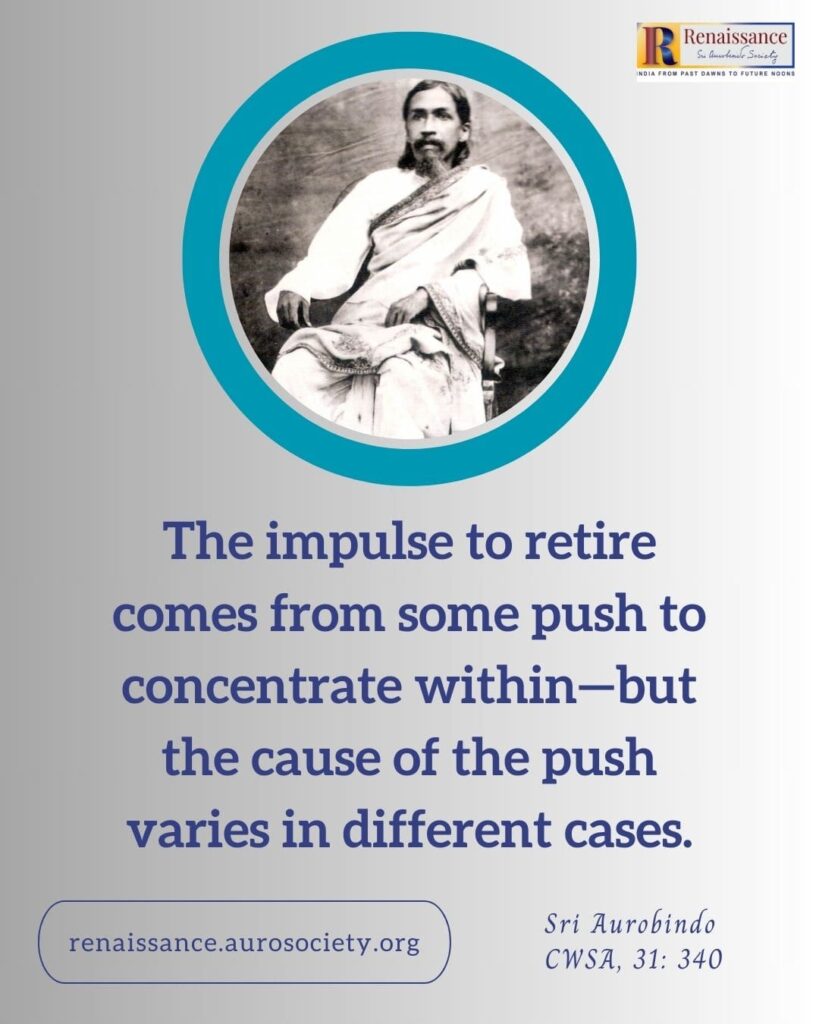
***
How are you going to find the right external relations by withdrawing altogether from external relations? And how do you propose to be thoroughly transformed and unified by living only in the internal life, without any test of the transformation and unity by external contact and the ordeals of the external work and life? Thoroughness includes external work and relations and not a retired inner life only.
It is only by the vital ego giving up its demands and claims and the reactions these produce when not satisfied, that the transformation and unification can come, and there is no other way.
***
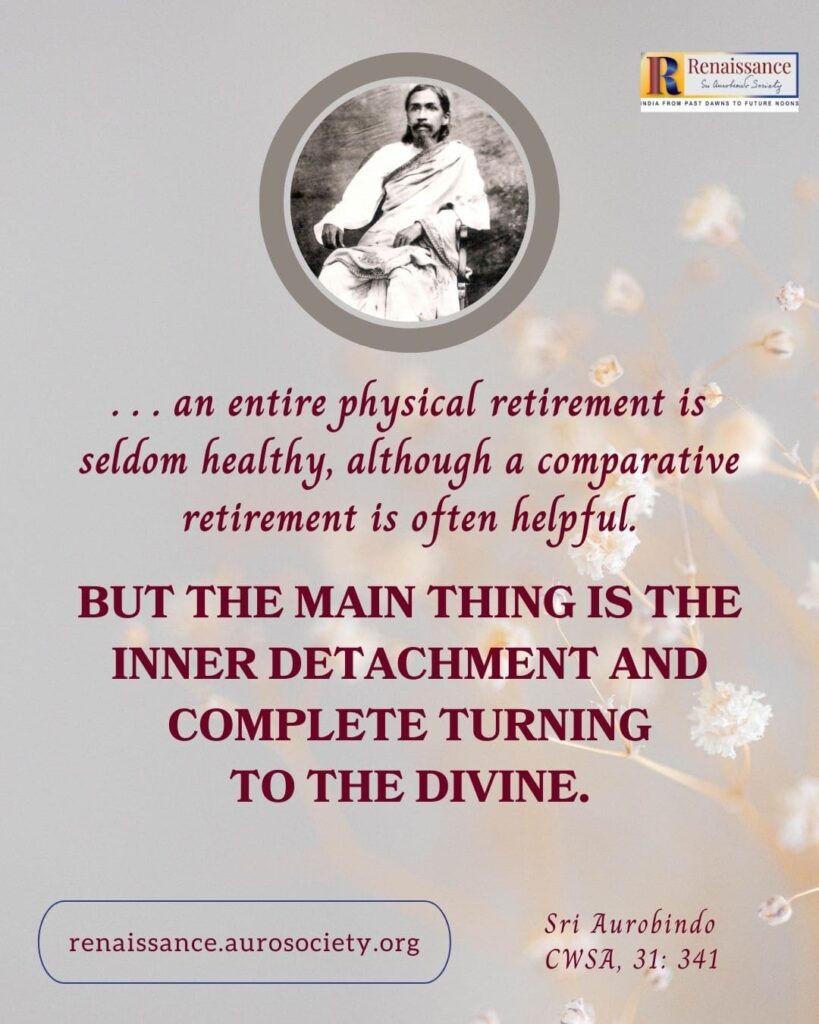
***
Dangers of Complete Retirement
Retirement in the sense of all meditation without work is not suitable to this sadhana—it is one-sided and those who resort to it, unless they are very strong, often lose their balance.
***
To have no contact with people and shut oneself entirely is not healthy. But one can for a time diminish outward contacts so as to concentrate.
***
Not speaking or contacting when one is in the intensity of the peace is one thing—that can be done. Remaining isolated at other times as a rule of life does not seem to me necessary—it is safe only for those who can live entirely within without losing their hold on outer reality. If one has always a solid poise of peace one can do that or a clear mind balanced and discriminating along with constant experiences which it is able to put in the right place.
But some get absorbed in inner experiences which they get lost in and get passionately attached to and this inner life becomes for them the sole reality without the outer to poise it and keep it under check and test—there lies a danger.
Again if one remains isolated without the support of a settled inner poise and constant experience over which one has a discriminating control, then in periods of emptiness the vital can arise bringing struggles, difficulties, unrest, suggestions of all kinds, a troubled and turbid state—rather than spend the time in that, as some do, it is better to mix with others or do some work or otherwise externalise oneself in a healthy way.
***
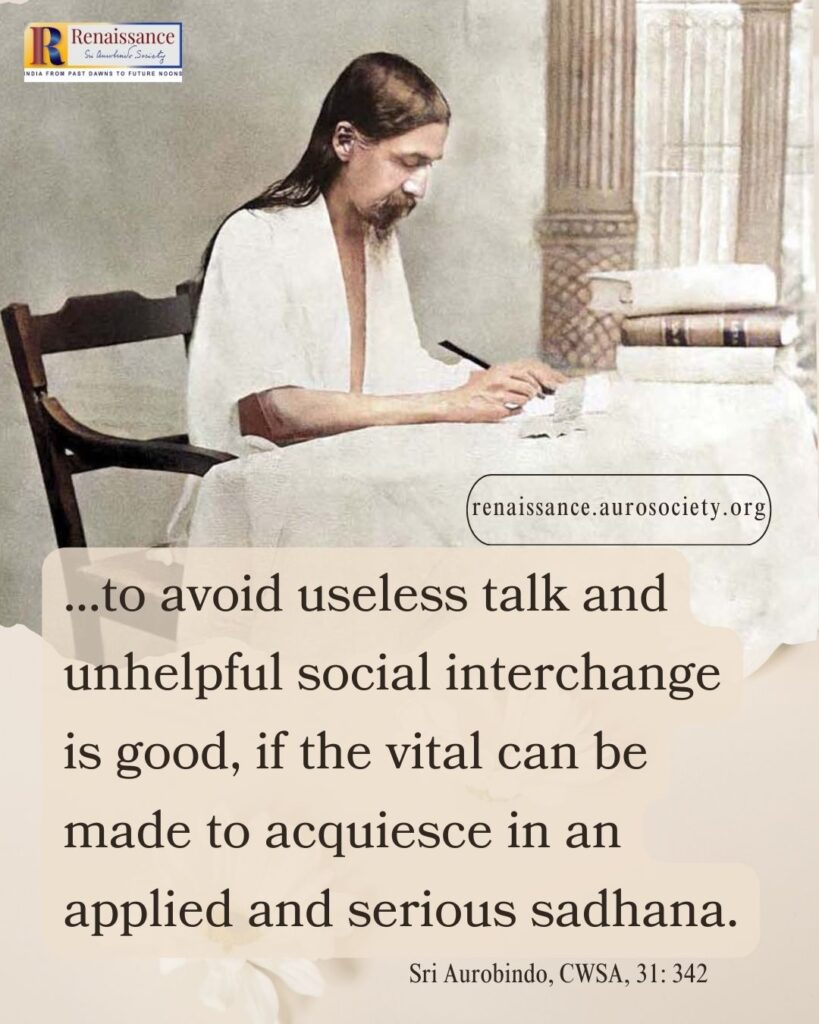
***
Exclusive Concentration as Means to an End
And if some find that retirement is the best way of giving oneself to the Higher, to the Divine by avoiding as much as possible occasions for the bubbling up of the lower, why not? The aim they have come for is that and why blame or look with distrust and suspicion on the means they find best or daub it with disparaging adjectives to discredit it—grim, inhuman and the rest?
It is your vital that shrinks from it and your vital mind that supplies these epithets which express only your shrinking and not what the retirement really is. For it is the vital or the social part of it that shrinks from solitude; the thinking mind does not but rather courts it.
The poet seeks solitude with himself or with Nature to listen to his inspiration; the thinker plunges into solitude to meditate on things and commune with a deeper knowledge; the scientist shuts himself up in his laboratory to pore by experiment into the secrets of Nature; these retirements are not grim and inhuman. Neither is the retirement of the sadhak into the exclusive concentration of which he feels the need; it is a means to an end, to the end on which his whole heart is set.
As for the Yogin or bhakta who has already begun to have the fundamental experience, he is not in a grim and inhuman solitude. The Divine and all the world are there in the being of the one, the supreme Beloved or his Ananda is there in the heart of the other.
I say this as against your depreciation of retirement founded on ignorance of what it really is; but I do not, as I have often said, recommend a total seclusion, for I hold that to be a dangerous expedient which may lead to morbidity and much error. Nor do I impose retirement on anyone as a method or approve of it unless the person himself seeks it, feels its necessity, has the joy of it and the personal proof that it helps to the spiritual experience.
It is not to be imposed on anyone as a principle, for that is the mental way of doing things, the way of the ordinary mind—it is as a need that it has to be accepted, when it is felt as a need, not as a general law or rule.
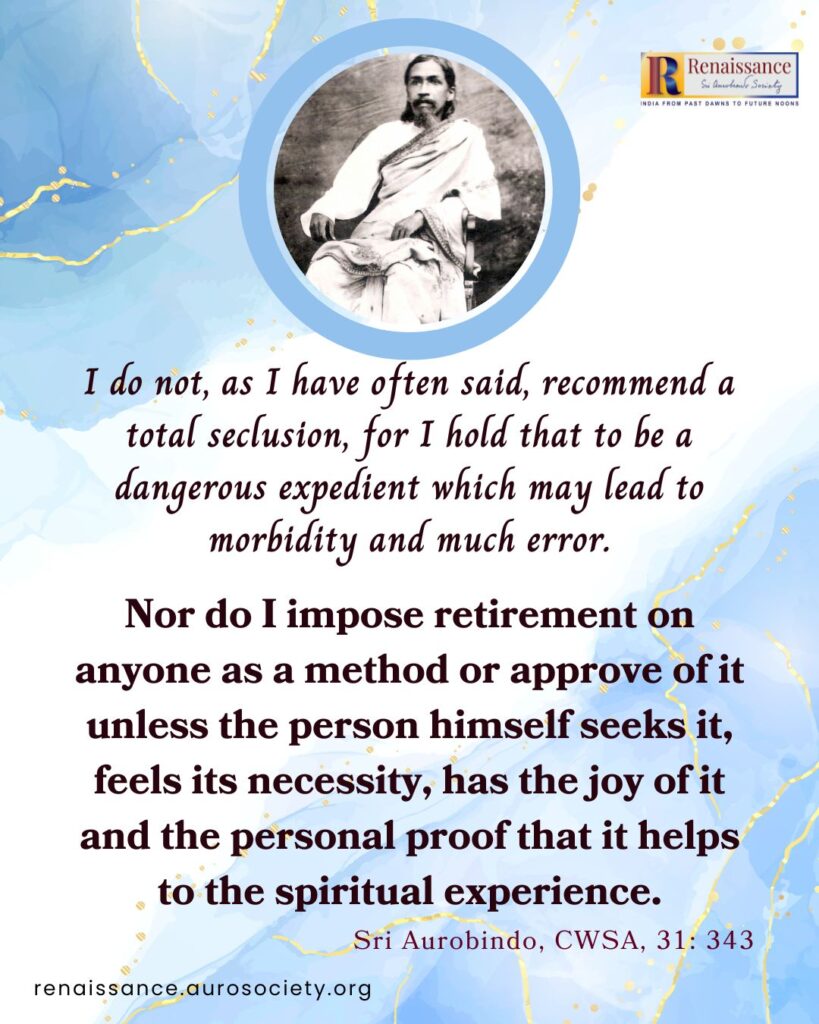
***
Individual Swabhāva Matters
No, there is no obligation of gloom, harshness, austerity or lonely grandeur in this Yoga.
If I am living in my room, it is not out of a passion for solitude, and it would be ridiculous to put forward this purely external circumstance—or X‘s withdrawnness which is a personal necessity of his sadhana—as if it were the obligatory sign of a high advance in the Yoga or solitude the aim; these are simply incidents which none is called on to imitate.
So you need not be anxious; solitude is not demanded of you, for an ascetic dryness of isolated loneliness cannot be your spiritual destiny since it is not consonant with your swabhava which is made for joy, largeness, expansion, a comprehensive movement of the life-force. And, as for stern gravity and the majesty of a speechless and smileless face, your transformation into that would be terrifying to think of!
I may remind you that the Mother and myself always recommended to you a sunlit and cheerful progress as the best; if we were inclined to complain of anything in you—which we are not, knowing that one does not choose one’s difficulties,—it would not be that you have too much gaiety but that you are not always as gay and cheerful as we would like you to be!
The storm, cloud, difficulty, suffering come, but they are no part of the Yogic idea; they belong to the Nature that is now, not to the divine Nature that is to be.
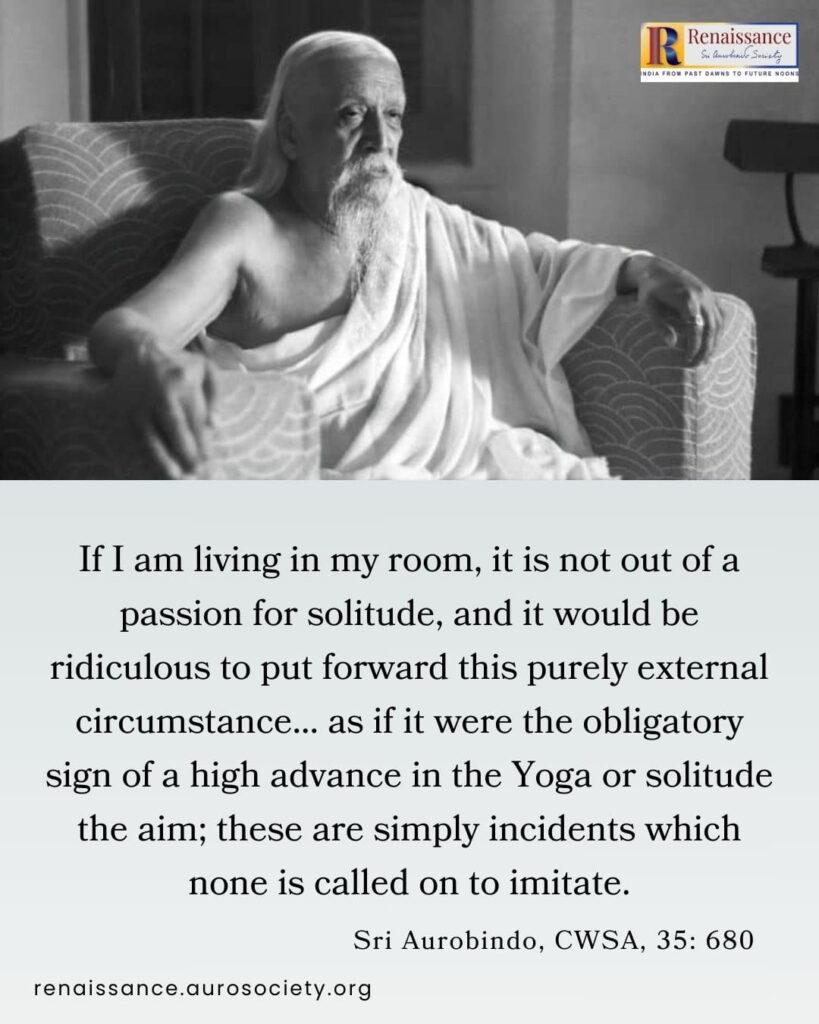
Also read:
Sri Aurobindo on His Silence, Nirvana and Sadhana
~ Design: Beloo Mehra

